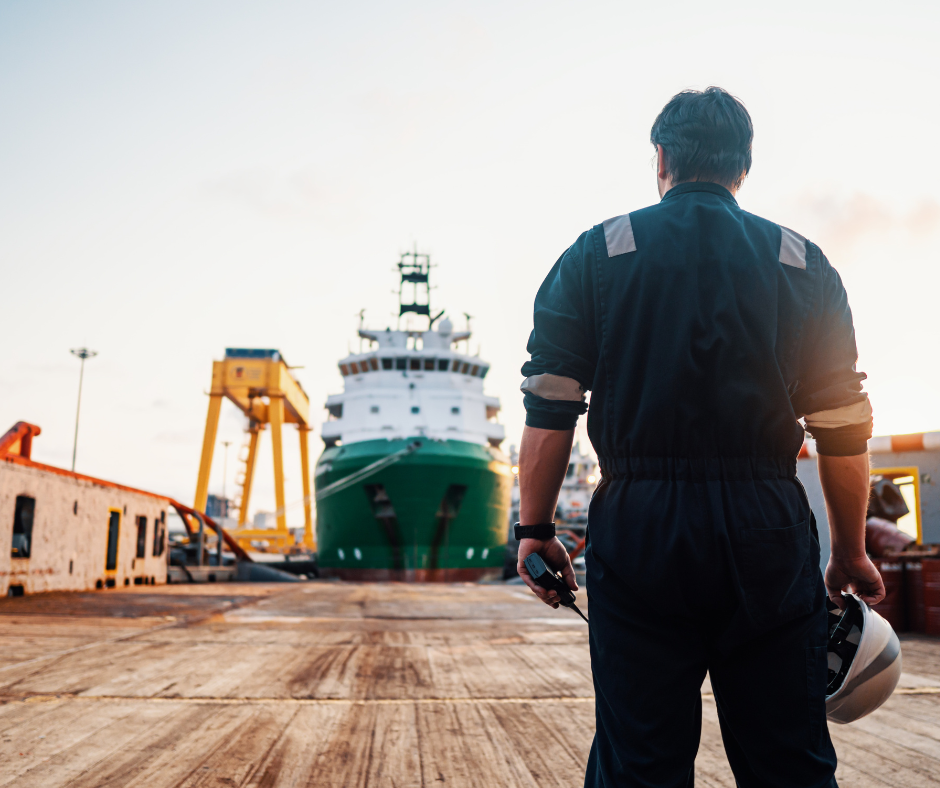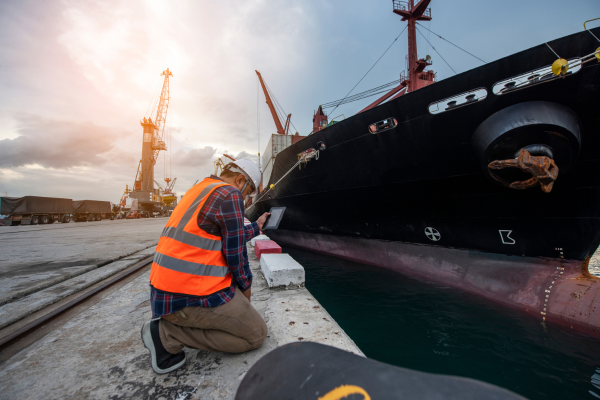Filing and Proving a Maritime Injury Claim
Over $1 Billion Recovered for Maritime Accident Victims. We are proud to have a reputation for aggressively fighting for the rights of injured workers.
Here’s what we’ll cover:
At Lambert Zainey Smith & Soso, we’ve been helping injured maritime workers for over 40 years. We understand the complexities of maritime law and are here to guide you every step of the way.
Who Can File a Claim?
Maritime workers face unique risks on the job, and different laws protect different types of workers. If you’ve been injured, the type of claim you can file depends on your job role and where the injury occurred.
Here’s a quick breakdown of the major maritime laws that may apply to your case:
Seamen: Protected by the Jones Act
Seamen who spend at least 30% of their working time on a vessel in navigation are likely covered under the Jones Act. This law allows injured seamen to file claims against their employer for negligence or unsafe working conditions.
Learn More: The Jones Act: Your Rights as a Seaman
Longshoremen and Dockworkers: Covered by the LHWCA
If you work loading, unloading, repairing, or building ships in a maritime facility, you may be covered under the Longshore and Harbor Workers’ Compensation Act (LHWCA). Unlike the Jones Act, the LHWCA provides workers’ compensation-style benefits without needing to prove employer negligence.
Learn More: LHWCA Benefits and Eligibility
Offshore Workers: Protected by the Outer Continental Shelf Lands Act (OCSLA)
Workers injured on oil rigs, offshore platforms, or structures attached to the seafloor are often covered under the Outer Continental Shelf Lands Act (OCSLA). This law provides benefits similar to the LHWCA but applies specifically to offshore injuries.
Learn More: How OCSLA Protects Offshore Workers
Families: Filing Under the Death on the High Seas Act (DOHSA)
If a maritime worker dies due to an offshore accident more than 3 nautical miles from shore, surviving family members may seek compensation under the Death on the High Seas Act (DOHSA).
Learn More: Understanding DOHSA and Wrongful Death Claims
General Maritime Law Protections
If you don’t fall under one of the categories above, General Maritime Law may still provide protections. Certain workers, such as commercial divers, tankermen, and ferry workers, may have additional legal options.
Learn More: General Maritime Law and Your Rights
Not Sure If You Qualify?
If you’re unsure whether you’re eligible to file a maritime injury claim, we can help. Our attorneys will review your case, determine which law applies to you, and guide you through the process.
Over $1 Billion Recovered for Accident Victims

Oil storage tank rupture at the Murphy Oil USA refinery in Chalmette, LA. The fastest class certification and resolution of a case of its type and magnitude to date.

Arco cryogenic platform explosion caused by improper cold cut of Southern Natural Gas pipeline. Settlement for the injured and deceased in approximately twelve months.
How to Start Your Claim
Taking the right steps immediately after a maritime injury can make a significant difference in the strength of your claim. Follow these key actions to protect your rights and maximize your compensation.
1. Report Your Injury Immediately
Your employer needs to be informed of your injury immediately or as soon as you are physically able.
Why This Matters:
What to Include in Your Report:
Always request a copy of the injury report for your own records.
2. Seek Medical Attention Immediately
Your health is the priority, so get medical care as soon as possible — even if your injury seems minor.
Your Right to Choose a Doctor:
What to Document:
Learn More: Do I Have to See a Company Doctor?
3. Document Everything
The more evidence you gather, the stronger your claim will be. Start collecting documentation and keeping records as soon as possible after your injury.
Key Evidence to Gather:
4. Consult an Experienced Maritime Attorney
Maritime law is complex, and your employer and their insurance company have legal teams working to limit your claim. Having an experienced maritime lawyer on your side ensures your rights are fully protected.
What an Attorney Can Do:
Why It Matters:
Learn More: Do I Need a Maritime Attorney?
5. File Your Claim Before the Deadline
Maritime laws have strict time limits for filing claims, known as statutes of limitations. Missing these deadlines can permanently bar you from recovering compensation.
Key Deadlines:
Learn More: How Long Do You Have to File a Claim?
Not Sure Where to Start? We Can Help.
Filing a claim doesn’t have to be overwhelming. At Lambert Zainey Smith & Soso, we have over 40 years of experience helping injured maritime workers take the right legal steps. Let us guide you through the process and fight for the compensation you deserve.
What to Expect During the Claims Process
Filing a maritime injury claim can be a complex process. Knowing what to expect ahead of time will help you stay prepared, manage your expectations, and avoid unnecessary stress. Here’s a breakdown of the key stages in the claims process:
2. Investigation and Evidence Gathering
After your claim is filed, both sides — your attorney and the employer’s legal team — will conduct investigations.
Your Attorney Will:
The Employer May:
Tip: Be cautious of employer surveillance and ensure your evidence is thorough and accurate.
3. Negotiations and Settlement Offers
In many cases, the employer or their insurance company may offer to settle your claim before it goes to court.
Why This Happens:
What to Watch For:
4. Litigation (If Needed)
If a fair settlement cannot be reached, your attorney may recommend pursuing your claim in court.
What Happens in Court:
How Long It Can Take:
5. Resolution and Compensation
The final stage of the process is resolving your claim, either through a settlement or court verdict.
Compensation You May Be Able To Recover:
What Happens Next:
How Long Does the Process Take?
The timeline for resolving a maritime injury claim varies depending on the complexity of the case:
Related Resource: How Long Do Maritime Claims Take?
Let Us Guide You Through the Claims Process
Navigating the maritime claims process can be intimidating, but you don’t have to face it alone. At Lambert Zainey Smith & Soso, we’ve helped maritime workers file, negotiate, and win their claims for over 40 years.
Frequently Asked Questions About Filing and Proving a Maritime Injury Claim
Proving Your Claim: Key Evidence Needed
To successfully recover compensation, you need strong evidence that proves:
The stronger your evidence, the harder it will be for your employer or insurance company to deny your claim. Here’s what you need to collect.

Medical Records and Doctor’s Reports

Medical Records and Doctor’s Reports
Your medical documentation is one of the most critical pieces of evidence in your case. It verifies the extent of your injuries and helps establish how the accident impacted your ability to work.
Key Documents to Collect:
Remember, you are not required to see a company doctor.

Photos and Videos of the Incident

Photos and Videos of the Incident
If possible, take photos or videos immediately after the accident. This evidence helps prove hazardous conditions or employer negligence.
If you’re unable to take photos, ask a trusted coworker to document the scene.
What to Capture:

Witness Statements

Witness Statements
Statements from coworkers or other witnesses can provide crucial third-party verification of the accident.
Who to Ask:
How to Document:
Tip: Witnesses may be hesitant to speak out against their employer — your attorney can help gather and preserve their statements.

Employer Records and Reports

Employer Records and Reports
Your employer’s own records may contain key evidence of unsafe working conditions or violations of safety protocols.
What to Look For:
Learn More: Employer Responsibilities Under Maritime Law

Personal Documentation

Personal Documentation
Your own records and notes can help track the impact of your injury over time.
What to Keep a Record Of:

Role-Specific Evidence Examples

Role-Specific Evidence Examples
Different maritime jobs involve unique risks, and the evidence needed may vary by role. Here are some examples:
How an Attorney Helps Prove Your Claim
An experienced maritime injury attorney ensures that critical evidence is collected, preserved, and presented properly. They can:
How a Lawyer Helps:
Challenges in Maritime Injury Claims
Filing a maritime injury claim isn’t always straightforward. Employers and insurance companies often use aggressive tactics to delay, deny, or minimize your compensation. Understanding these challenges will help you stay prepared and protect your rights.
Denial of Injury or Liability
Retaliation and Blacklisting
Employers may illegally retaliate against injured workers who file claims. This includes wrongful termination, blacklisting, or reduced work hours.
What This Looks Like:
How to Fight Back:
Learn More: Can You Be Blacklisted for Filing an Offshore Injury Claim?
Surveillance and Employer Investigations
Employers and insurance companies often hire private investigators to monitor injured workers in an attempt to discredit their claims.
What This Looks Like:
How to Protect Yourself:
Related Resource: How Social Media Can Sink Your Maritime Injury Case
Premature Termination of Maintenance and Cure
Under General Maritime Law, injured seamen are entitled to maintenance and cure — payments covering basic living expenses and medical treatment until they reach maximum medical improvement (MMI). However, some employers cut off these benefits too soon.
What This Looks Like:
How to Fight Back:
Related Resource: Punitive Damages for Maintenance and Cure Claims
Lowball Settlement Offers
After filing your claim, your employer or their insurance company may offer a quick settlement in hopes that you’ll accept less than what you deserve.
Why This Happens:
How to Fight Back:
Don’t Let Employer Tactics Hurt Your Claim
Employers and insurers often try to delay, deny, or minimize maritime injury claims. At Lambert Zainey Smith & Soso, we know their tactics — and we know how to fight back.
Take the Next Step: Protect Your Rights and Secure Your Compensation
Filing a maritime injury claim is not just about getting compensation — it’s about protecting your future. Employers and insurance companies often try to delay, deny, or minimize claims, but you don’t have to fight this battle alone.
At Lambert Zainey Smith & Soso, we’ve been fighting for injured maritime workers for over 40 years. We know the complexities of maritime law, how to hold negligent employers accountable, and how to maximize compensation for injured workers.
If you’ve been injured working offshore, on a vessel, or in a maritime facility, don’t wait — the sooner you act, the stronger your case.Schedule a free consultation today and let us review your case, explain your legal options, and guide you through the claims process. We work on a contingency fee basis, meaning you pay nothing unless we win your case.
Recent News
Seacor Power Capsizing: Lambert Zainey Secures Resolution for All Families Affected by Tragedy
Maritime Slip, Trip and Fall Accidents: A Guide for Workers
Is My Spouse Entitled to My Personal Injury Settlement in Louisiana?
What Our Clients’ Say About Us
NATIONALLY RECOGNIZED ATTORNEYS
CONTACT US
Our experienced attorneys are here to guide you through every step of the process, from initial consultation to settlement or trial.
Free Case Review
Fill out the form below to contact Lambert Zainey and schedule a free, confidential consultation and discuss your case with an experienced attorney.












